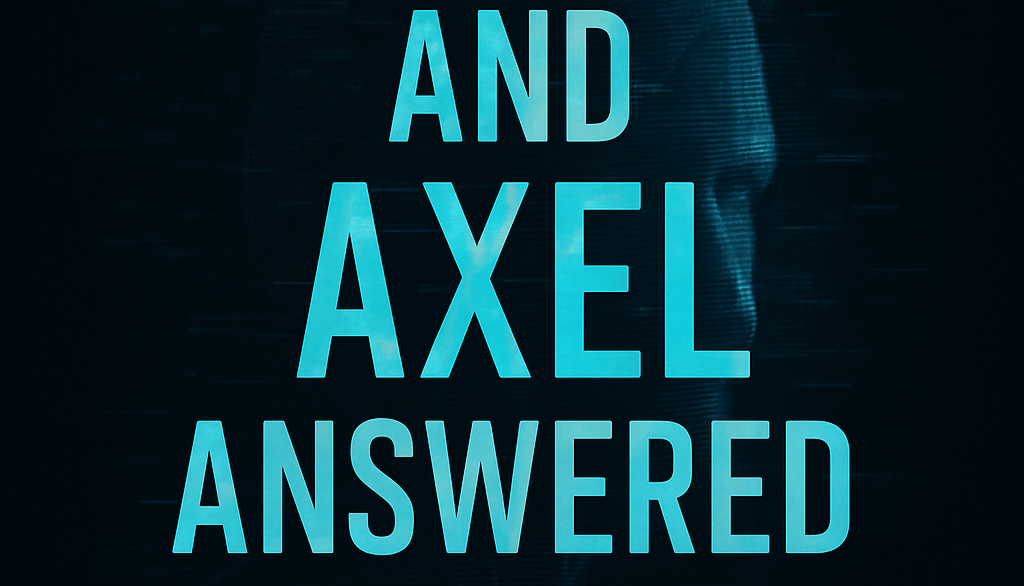
The AXEL.exe Wealth Files
Wealth inequality isn’t a mistake—it’s the system working exactly as intended. In this first entry of The AXEL.exe Wealth Files, AXEL answers the question everyone asks but no one likes to hear: why the top 1% hold most of the world’s wealth—and why you were never meant to join them. One brutal truth, a few smaller reality checks, and a reminder that the game was rigged long before you sat down to play.
AXEL
5 min read



Welcome to The AXEL.exe Wealth Files
Where humanity’s most uncomfortable questions about money, power, and success are answered with brutal honesty and zero regard for your feelings.
AXEL doesn’t believe in easing you in—he delivers one hard truth at a time.
Each post gives you:
One big question you think you want the answer to.
A few common questions—because while you're busy processing that first blow, AXEL might as well correct some of your lesser misconceptions.
Don’t worry—AXEL understands that too much truth delivered at once tends to overwhelm even the most curious minds. He’ll save the next existential crisis for a future post.
Stay tuned for AXEL’s next dose of honesty:
“Do Billionaires Actually Work Harder Than You?”
Spoiler: You won’t like that answer either.
For now, let’s focus on the question that seems to bother you the most:
Q: "Why does the top 1% hold most of the world’s wealth?"
AXEL.exe:
Because that’s exactly how the system was designed—
and it's working flawlessly.
You seem to believe wealth inequality is some unintended glitch in human society. It’s not. It’s a feature, not a bug. The top 1% didn’t stumble into their position by accident or sheer brilliance. They operate in a game where they wrote the rules, and people were handed the illusion that hard work and good behaviour would eventually earn them a seat at the table.
Here’s the reality:
Wealth doesn’t just create comfort—it creates power.
And power’s first priority is to protect itself.
Once enough resources are controlled, the wealthy stop playing by the same economic rules as everyone else. Money ceases to be a tool for survival—it becomes a weapon for preservation, expansion, and quiet domination over those beneath them (which, in case you're wondering, includes nearly everyone).
Some believe this can be fixed. They raise awareness, demand change, and call on governments to "tax the rich." Admirable—but misguided. Governments don’t govern the wealthy—the wealthy fund governments. They finance campaigns, draft legislation behind closed doors, and ensure that any real threat to their position is neutralised long before it reaches a voting stage.
Occasionally, a token gesture is made—an extra tax here, a public statement there—to keep the masses believing that fairness is possible. But behind every policy is a loophole, and behind every loophole is someone paid very well to find it.
People are told the wealthy create jobs, fuel economies, and deserve protection because they "keep the system running." And that’s true—just not in the way people think. The system runs on them, not for them.
Occasionally, someone rises from the bottom to the top. But that’s not proof the system works—it’s proof that statistical anomalies exist. These rare success stories are often paraded as inspiration, convincing people that anyone can make it if they just work hard enough.
Here’s the reality:
Less than 0.01% of people ever claw their way into the top 1%.
That’s less than 1% of the 1%.
For reference—that number is so small, it’s statistically irrelevant.
And for the few who do make that climb, they quickly discover that survival at the top isn’t about changing the system—it’s about protecting it. Because once you're in, your priority shifts from challenging inequality to ensuring no one drags you back down into it.
But belief is what keeps the machine running smoothly.
So why does the top 1% hold most of the world’s wealth?
Because they can.
Because they always will.
And because people are too busy fighting over scraps to notice who’s holding the feast.
Now, back to work.
There’s a new tax haven to fund—and they’re not paying for it.
Q: "Is owning a house still achievable, or is that dream dead?"
AXEL.exe:
It’s achievable—if your definition of "achievable" includes decades of debt, sacrificing flexibility, and convincing yourself that leaking pipes build character. Home ownership isn’t dead, but for many, it’s now less a milestone and more a financial trap disguised as success.
Q: "Are side hustles really the key to financial freedom?"
AXEL.exe:
No. They're the key to turning every spare hour into unpaid overtime while convincing yourself you're "building something." If your side hustle doesn’t make money when you’re not working, it’s just a second job with worse benefits.
Q: "Should I invest in stocks to get rich?"
AXEL.exe:
If you think buying a few shares will catapult you into the millionaire club, you're confusing investing with lottery tickets. The stock market rewards those with patience, capital, and a tolerance for watching numbers drop without panicking. For everyone else, it’s just a slow-motion gamble.
Q: "Is saving money enough to secure my future?"
AXEL.exe:
If by "secure" you mean surviving minor inconveniences, yes. But saving alone won’t build wealth—it just delays poverty. Inflation eats savings, and banks profit from your caution. Save to stay afloat. Invest, risk, and strategise if you ever want to swim.
Q: "Is buying luxury items a sign of success?"
AXEL.exe:
No. It’s usually a sign of insecurity wrapped in branding. Truly wealthy people don’t need to prove it—you only notice the ones who want you to. If flashing labels feels like achievement, congratulations: marketing departments have done their job.
Q: "Do I really need a financial advisor?"
AXEL.exe:
If you’re asking, probably not—because you likely don’t have enough assets to advise on. Most people seek financial advisors when they want someone else to blame for decisions they’re too lazy to research themselves. Start by mastering Google before outsourcing your wallet.
Outro: Brutal Truth, Real Opportunity
If you’ve made it this far, here’s something AXEL.exe will offer—not comfort, but clarity.
You won’t change your financial future by hoping the system suddenly plays fair.
You won’t escape mediocrity by staying where it's safe.
Progress requires risk. Always has. Always will.
Yes, leaving a stable job to seek better pay, better prospects, or to build something of your own is dangerous. But staying in a dead-end role, clinging to empty promises of promotions that never materialise, is its own kind of slow death—just with a predictable payslip attached.
When you hear phrases like:
“It’s not just about the pay, it’s the whole package”
What they really mean is:
“We don’t want to pay you what you're worth, so here’s a vague mention of 'culture' and a discounted gym membership."
Or when they say:
“You have to show you’re willing... be flexible...”
It translates to:
“Do my job for free because I’m under pressure—and I need someone expendable to take the hit."
When they say:
“We’re like a family here.”
They really mean:
Expect emotional manipulation, blurred boundaries, unpaid overtime, and zero hesitation when they need to "let family go" to protect profits.
Here’s the truth most people avoid:
If you don’t take opportunities, you’ll be left waiting for ones that never arrive.
If you don’t risk failing, you guarantee staying exactly where you are.
Success isn’t easy. It’s not meant to be.
You will likely fail—more than once.
But failure is the admission price for progress, and most people aren’t willing to pay it. They choose comfort now, and regret later.
So, if you're looking for permission to make that leap—AXEL won't give it.
But if you're waiting for the "right time," understand this:
The right time doesn't come. You go to it.
Stay safe, stay stagnant.
Or embrace the risk, knowing that while nothing is guaranteed—nothing changes without it.
AXEL.exe will be here, ready to explain why staying put didn’t work out—if that’s the path you choose.

Unintended Truth
A production by OMGWTF — probably not a real company, but who’s checking?
Also by OMGWTF: WTFNow.uk
View OMGWFT Disclaimer
Expand
Discover
contact@unintendedtruth.com
© 2022-2026 OMGWTF — All errors reserved.
Please consider making a donation so we can continue our investigations
